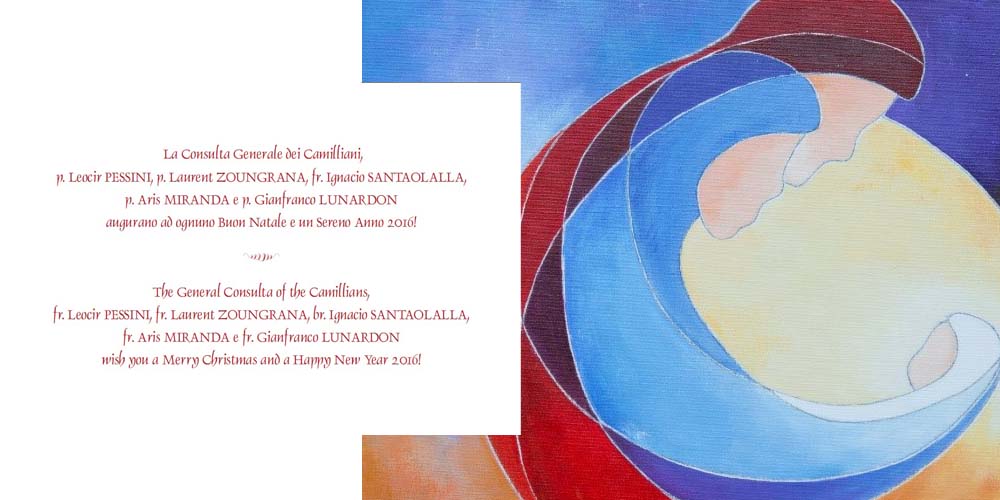DECEMBER 2015
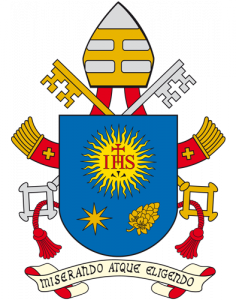 Miserando atque Eligendo
Miserando atque Eligendo
He looked with mercy and chose him
Pope Francis, faithful not only to his episcopal coat of arms but also to his spirit of evangelical faith, has opened the Extraordinary Jubilee for the whole of the Church: the Holy Year of Mercy.
In the episcopal coat of arms of Pope Jorge Mario Bergoglio there are three Latin words which cannot be understood immediately and they are: ‘Miserando atque eligendo’.
But if one looks at where these words come from, one discovers important features of the life and ministry of Pope Francis.
The motto comes from a homily of the Venerable Bede (672-735), a monk of Wearmouth and Jarrow, the author of exegetic, homiletic and historical works, amongst which his Historia ecclesiastica gentis Anglorum which led him to be called the ‘father of English history’.
In his homily, which is the twentieth of those that have come down to us, Bede comments on the passage of the Gospel which narrates the calling to the apostolate of Matthew, a public sinner.




In the passage from which the motto is taken we can read: ‘Jesus saw a man named Matthew sitting at the tax bench and said to him “follow me” (Matthew, 9:9). He looked at him not only with the eyes of his body but also with his interior goodness. He saw a tax collector and as he looked at him with merciful love before choosing him, he said to him: “follow me!”. He said “follow me”, that is to say imitate me. He said “follow me” not so much through a movement of his feet as through the practice of his life. Indeed, ‘those who say they dwell in Christ must behave as he behaved’ (John 2:6)’.
In Latin the passage begins in the following way: ‘Vidit ergo Iesus publicanum, et quia miserando atque eligendo vidit, ait illi, Sequere me. Sequere autem dixit imitare. Sequere dixit non tam incessu pedum, quam exsecutione morum’.
The inclusion in the coat of arms of the motto ‘Miserando atque eligendo’ thus means to place oneself in the shoes of Matthew whom Jesus looked at with mercy and called to him, despite his sins.



This was the programme of St. Francis of Assisi and it forms a part of the coat of arms of Pope Francis.
ROME



THE PHILIPPINES






PERU



Below we offer a short witness to Camillian life and the Camillian vocation…
‘I want to pass through this world to serve others’
TAIWAN



On 21 November, in the parish of Lotung, the solemn religious professions of three women Ministers of the Sick were celebrated.
INDONESIA
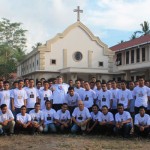


MESSAGE OF THE SUPERIOR GENERAL TO THE INDONESIAN DELEGATION ON THE OCCASION OF HIS FIRST FRATERNAL VISIT TO THAT DELEGATION
ROME – Generalate House
On 3-5 December the Central Economic Commission of the Order met for the third time after its creation and for the second time during the year 2015. The Superior General took part in the meeting.
On Friday 11 December at 16.00 at our generalate house the launch took place of the latest two volumes published in our historical research series on the oldest Camillian Provinces entitled ‘The History of the Camillian Order’: La Provincia Piemontese (‘The Province of Piedmont’) edited by W. Crivellin and La Provincia Siculo-Napoletana (‘The Province of Sicily and Naples’) edited by S. Andreoni, M. C. Giannini, and Pizzorusso.
ROME – The Rectory Church of St. Mary Magdalene
On Tuesday 8 December 2015 at 16.00 in the Church of St. Mary Magdalene we had our traditional but always keenly-felt appointment for the renewal of our religious vows. Our religious brothers in Rome, women Camillian religious and those who support our charism were invited for this moment of prayer and spirituality.
ROME – THE CAMILLIAN TASK FORCE
An appeal to Solidarity to Combat the Ebola virus



Recently, there was a notable tribute to the contribution of the Camillian Task Force (CTF) to the fight against the Ebola virus in Sierra Leone: ‘A Call to Impact and Solidarity in the Wake of Ebola. Accompanying Catholic Health Networks and Supporting Resiliency in West Africa’.



Therefore we invite you to attend the meeting to be held in Vienna on Jan. 5, 2016 at the Provincial House with the aim of:
- share experiences of refugee reception in progress
- build a route you can host a European dimension
- Develop some points that will help everyone to serve that this is a phenomenon increasingly challenging for our charism
WOMEN MISSIONARIES OF THE SICK ‘CHRIST THE HOPE’
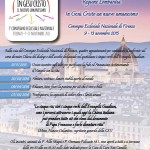


MADAGASCAR



Despite the intense heat, the pilgrims took part with great devotion, praying for the sick and for peace after the terrorist attacks in Paris.
HAITI
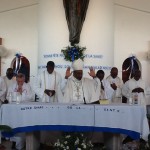


ROME – THE CAMILLIANUM
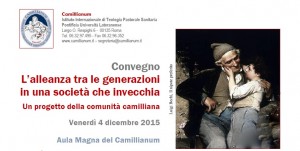


The fall in birth rates and the rapid development of biomedical knowledge and technology have brought about a steady and significant ageing of the population, creating new possibilities at the level of life expectancy.
An elderly person certainly does not possess the physical resources of young person but his or her contribution is not for this reason less fertile. One need only think of continuity with the past and his or her experience of life within the context of a society folded in on the present and strongly fragmented – that is to say our society.
This meeting, organised by the Camillianum and the General Secretariat for Ministry of the Order of Camillians, sought to offer a valid model for an alliance between the generations, a response to the so-called ‘throwaway’ and exclusion culture (Evangelii gaudium, n. 43).
During the first sessions of the deliberations of this meeting, the coordinates of the art of ageing of a Christian approach were analysed, with theological, philosophical and ethical contributions being made to the meeting. During the second session, the analysis centred around the Letter of the Superior General of the Camillians ‘To Our elderly and Sick Religious Brothers’ which centres around the value of sharing and non-marginalisation, an invitation to live with dignity and elegance a stage of life which is made up ‘not only of memories but also of dreams’, our Sunday of life.
BURKINA FASO



Download the invitation here



AGENDA OF THE SUPERIOR GENERAL AND THE GENERAL CONSULTA
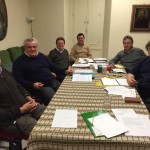


In ITALY Leocir Pessini took part on 5-6 December in the formation weekend for Camillian religious organised by the Province of North Italy on the subject ‘The Crisis of Religious Life as a Danger and an Opportunity’ at the Centro Pastorale Ambrosiano – Seveso(Monza-Brianza).
On 7 December he met our religious brothers of the hospital chaplaincy of Pavia.
On 26-30 December 2015 he will visit our religious brothers of the Delegation of Argentina.
On 11-13 January 2016 he will meet the Camillians of Bolivia; on 13-15 January 2016 he will visit the Camillian community of Chile; and on 18-27 January 2016 he will make a pastoral visit to the Camillians who live and work in Colombia.
From 28 November to 7 December the member of the General Consulta Fr. Aris Miranda was in Sierra Leone to supervise the development of the project of the Camillian Task Force for the Ebola virus emergency.
DECISIONS OF THE GENERAL CONSULTA
Mario Luis Kozik (the Province of Brazil) and Dr. Emilio Servando Villar Pernas (who works with the Province of Spain) have been appointed members of the Central Economic Commission of the Order.
The Camillian Province of Burkina Faso was canonically erected. The canonical date will be October 1, 2016. This is a beautiful occasion to commemorate the 50 years since the Camillians in that nation. In October, the General Superior and Consultors will meet with the Major Superiors of the Order in Ouagadougou.
The decision was taken to create the foundation the ‘Camillian Disaster Service International’ or more concisely ‘CADIS’. The current structure of the Camillian Task Force is a coordinated set of operational agencies and bodies through which, since the year 2001, the Order has offered overall help for the victims of natural or man-made disasters, providing humanitarian, health-care and pastoral support. At the present time all these agencies and bodies do not constitute, and are not under, an autonomous juridical body or even one with a specific legal status, given that the Camillian Task Force is an office of the generalate house and many of these are de facto entities (normally associations), that is to say they are not structured in a juridical sense and thus they also lack a specific legal status.
Because of these facts, a juridical reorganisation is required whose aim is to connect these operational entities which are under or are coordinates by the Roman office of the generalate house, thereby meeting the demands of internationalisation, taking part in decision-making processes, implementing fund raising activity, assuring respect for rules and regulations as regards accounting/financial/fiscal matters, and ensuring the limitation of responsibility as regards third parties.
Above all with reference to these last aspects, it is indispensable to proceed to a juridical separation of the generalate house from this set of operational entities with the creation of an authentic entity that will be endowed with suitable and adequate juridical autonomy and to which these agencies and bodies can formally adhere.
MERRY CHRISTMAS OF JESUS AND A HAPPY NEW YEAR 2016
DECEASED RELIGIOUS






Sister Alda was 90 (she was born in Fiano, Lucca, on 2/8/1925) and spent 69 years in religious life, dedicated to the service of God and her brethren most in need. During the last years of her life, the Lord united her to his passion in infirmity, and now she is with him in the light of his face which she loved and served.



‘Now they live in Christ whom they met in the Church, followed in our vocation, and served in the sick and the suffering. Trusting that the Lord, the Holy Virgin our Queen, St. Camillus, the Blessed Luigi Tezza and the Blessed Giuseppina Vannini, and our deceased religious brothers and sisters, will welcome them in their midst, we commend them in our prayers, remembering them with affection, esteem and gratitude’.
Thursday, December 10, 2015, Sister Rosalie Lovato died at the nursing home in Cremona. She was a religious Daughter of St. Camillus. She was 101 years and 8 months, 68 of them of religious profession.
THE HOLY YEAR OF MERCY
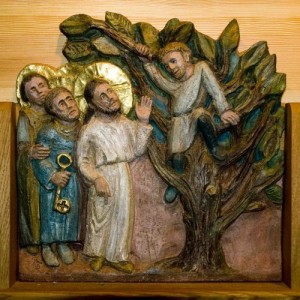


The Gospel we have heard (cf. Lk 7:36-50) opens to us a path of hope and comfort. It is good to feel Jesus’ compassionate gaze upon us, just as it was felt by the sinful woman in the house of the Pharisee. In this passage two words persistently return: love and judgment.
There is the love of the sinful woman who humbles herself before the Lord; but before that is the merciful love of Jesus for her, which drives her to approach him. Her tears of repentance and joy wash the feet of the Master, and her hair dries them with gratitude; the kisses are an expression of her pure love; and the perfumed ointment poured in abundance attests to how precious He is in her eyes. This woman’s every gesture speaks of love and expresses her desire to have unwavering certitude in her life: that of having been forgiven. And this certitude is beautiful! And Jesus gives her this certitude: in accepting her He demonstrates the love God has for her, just for her, a public sinner! Love and forgiveness are simultaneous: God forgives her many sins, He forgives her for all of them, for “she loved much” (Lk 7:47); and she adores Jesus because she feels that in Him there is mercy and not condemnation. She feels that Jesus understands her with love, she who is a sinner. Thanks to Jesus, God lifts her many sins off her shoulders, He no longer remembers them (cf. Is 43:25). For this is also true: when God forgives, He forgets. God’s forgiveness is great! For her now a new era begins; through love she is reborn into a new life.
This woman has truly encountered the Lord. In silence, she opened her heart; in sorrow, she showed repentance for her sins; by her tears, she appealed to divine goodness to receive forgiveness. For her there will be no judgment but that which comes from God, and this is the judgment of mercy. The hero of this encounter is certainly love, a mercy which goes beyond justice.
Simon, the master of the house, the Pharisee, on the contrary, doesn’t manage to find the road of love. Everything is calculated, everything is thought out…. He stands firm on the threshold of formality. It is an unpleasant thing, formal love, he doesn’t understand. He is not capable of taking that next step forward to meet Jesus who will bring him salvation. Simon limits himself to inviting Jesus to lunch, but did not truly welcome him. In his thoughts Simon invokes only justice and in doing so he errs. His judgment of the woman distances him from the truth and prevents him from even understanding who his guest is. He stopped at the surface — at formality — incapable of seeing the heart. Before the parable of Jesus and the question of which servant would love more, the pharisee responds correctly: “The one, I suppose, to whom he forgave more”. Jesus doesn’t fail to observe: “You have judged rightly” (Lk 7:43). When Simon’s judgment is turned to love, then is he in the right.
Jesus’ reminder urges each of us never to stop at the surface of things, especially when we have a person before us. We are called to look beyond, to focus on the heart in order to see how much generosity everyone is capable of. No one can be excluded from the mercy of God; everyone knows the way to access it and the Church is the house where everyone is welcomed and no one is rejected. Her doors remain wide open, so that those who are touched by grace may find the assurance of forgiveness. The greater the sin, the greater the love that must be shown by the Church to those who repent. With how much love Jesus looks at us! With how much love He heals our sinful heart! Our sins never scare Him. Let us consider the prodigal son who, when he decided to return to his father, considers making a speech, but the father doesn’t let him speak. He embraces him (cf. Lk 15:17-24). This is the way Jesus is with us. “Father, I have so many sins….” — “But He will be glad if you go: He will embrace you with such love! Don’t be afraid”.
I am confident that the whole Church, which is in such need of mercy for we are sinners, will be able to find in this Jubilee the joy of rediscovering and rendering fruitful God’s mercy, with which we are all called to give comfort to every man and every woman of our time. Do not forget that God forgives all, and God forgives always. Let us never tire of asking forgiveness. Let us henceforth entrust this Year to the Mother of Mercy, that she turn her gaze upon us and watch over our journey: our penitential journey, our year-long journey with an open heart, to receive the indulgence of God, to receive the mercy of God’ (HOMILY OF THE HOLY FATHER FRANCIS, 13 March 2015).
PRAYER OF THE JUBILEE IN DIFFERENT LANGUAGES


